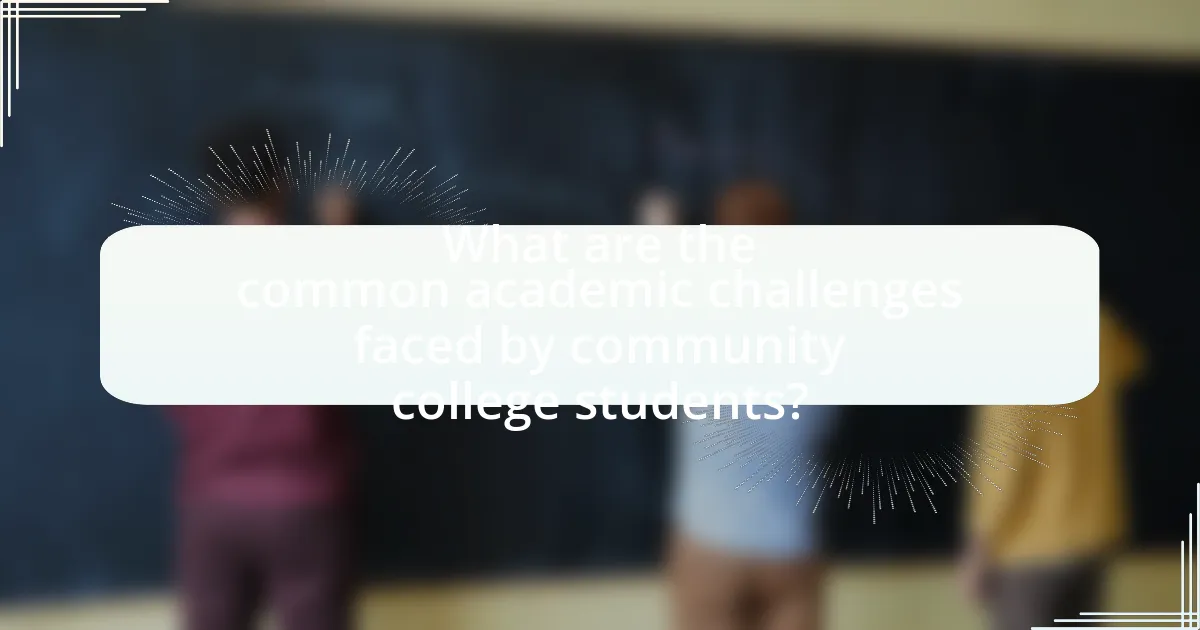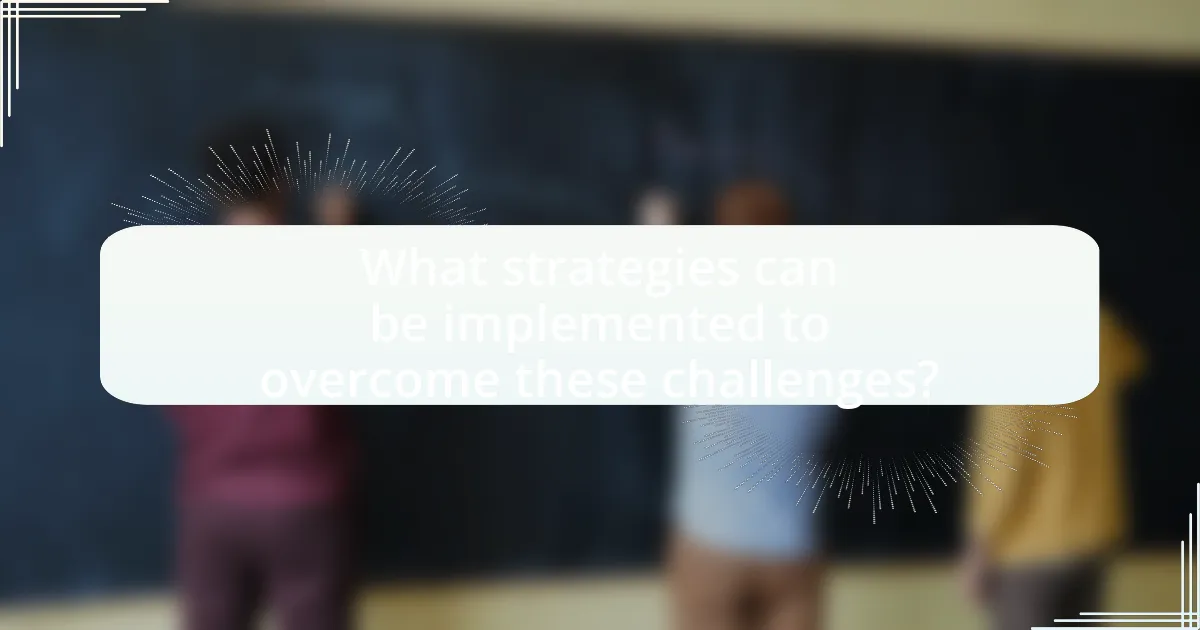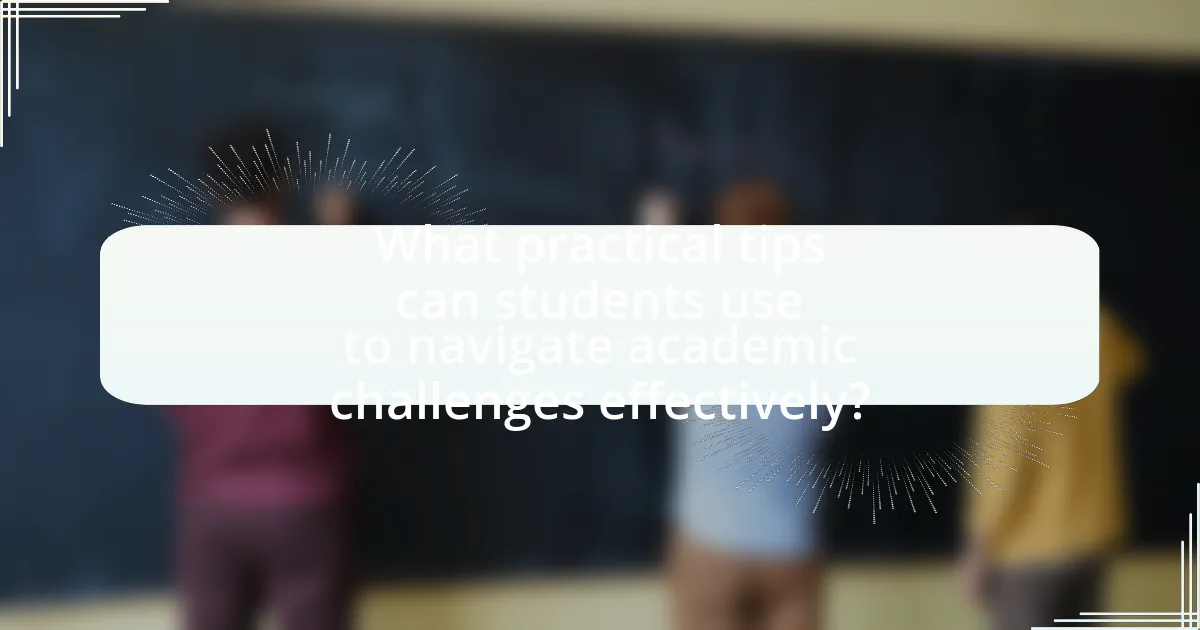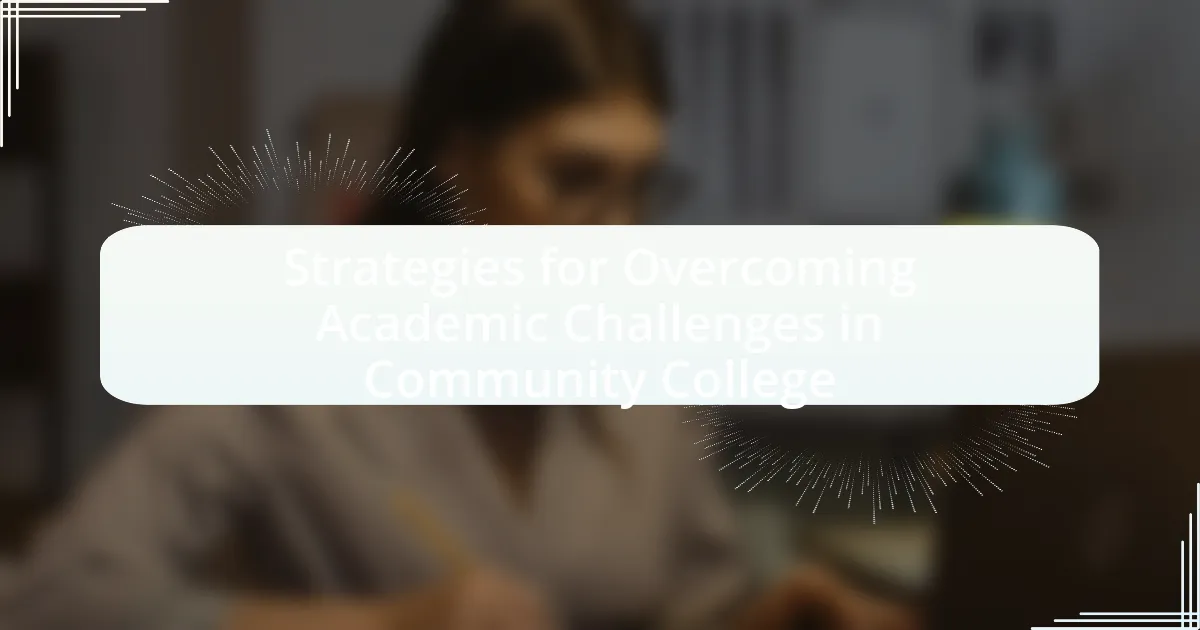The article focuses on strategies for overcoming academic challenges faced by community college students, highlighting common issues such as balancing work and study, financial constraints, and varying levels of academic preparedness. It discusses the impact of time management on academic performance and offers practical strategies to improve these skills, including prioritizing tasks and utilizing organizational tools. Additionally, the article addresses the role of financial stress in academic success and outlines available resources for financial assistance. It emphasizes the importance of support systems, effective study habits, and resilience in navigating academic difficulties, providing actionable tips for students to enhance their educational experience.

What are the common academic challenges faced by community college students?
Community college students commonly face challenges such as balancing work and study, financial constraints, and academic preparedness. Balancing work and study is significant, as many community college students work part-time or full-time jobs, which can limit their time for coursework and studying. Financial constraints often lead to stress, as students may struggle to pay for tuition, books, and living expenses, impacting their ability to focus on academics. Additionally, academic preparedness varies widely among students, with some lacking the foundational skills necessary for college-level coursework, which can hinder their performance. According to the National Center for Education Statistics, about 40% of community college students require remedial education, highlighting the prevalence of academic preparedness issues.
How do time management issues affect academic performance?
Time management issues negatively impact academic performance by leading to increased stress, missed deadlines, and lower quality of work. Students who struggle with managing their time often find themselves overwhelmed, which can result in procrastination and inadequate preparation for exams or assignments. Research indicates that effective time management is correlated with higher academic achievement; for instance, a study published in the “Journal of Educational Psychology” found that students who utilized time management strategies had significantly better grades compared to those who did not. This demonstrates that poor time management directly contributes to academic underperformance.
What strategies can help improve time management skills?
Effective strategies to improve time management skills include prioritizing tasks, setting specific goals, and utilizing tools like planners or digital apps. Prioritizing tasks helps individuals focus on what is most important, ensuring that critical assignments are completed first. Setting specific, measurable goals provides clear direction and motivation, making it easier to allocate time effectively. Utilizing planners or digital apps can enhance organization by allowing users to visualize their schedules and deadlines, which has been shown to increase productivity and reduce stress. Research indicates that students who implement structured time management techniques experience better academic performance and lower anxiety levels.
How can students prioritize their academic responsibilities effectively?
Students can prioritize their academic responsibilities effectively by utilizing a structured approach that includes creating a detailed schedule, setting specific goals, and regularly assessing their progress. A detailed schedule allows students to allocate time for each subject based on deadlines and exam dates, ensuring that they focus on high-priority tasks first. Setting specific, measurable goals helps students maintain clarity on what needs to be accomplished, while regular assessments of their progress enable them to adjust their strategies as needed. Research indicates that students who employ time management techniques, such as the Eisenhower Matrix, which categorizes tasks by urgency and importance, tend to achieve higher academic performance.
What role does financial stress play in academic challenges?
Financial stress significantly contributes to academic challenges by impairing students’ focus, motivation, and overall well-being. Research indicates that students experiencing financial difficulties often face increased anxiety and distraction, which can lead to lower academic performance and higher dropout rates. For instance, a study published in the Journal of Student Financial Aid found that 70% of students reported financial stress as a barrier to their academic success, highlighting its pervasive impact on educational outcomes.
How can students manage financial stress while studying?
Students can manage financial stress while studying by creating a detailed budget and seeking financial aid resources. Establishing a budget helps students track their income and expenses, allowing them to prioritize essential costs such as tuition, housing, and food. According to a report from the National Student Financial Aid Study, 70% of students who utilize financial aid report reduced financial stress, indicating that accessing scholarships, grants, and work-study programs can significantly alleviate monetary burdens. Additionally, students can explore part-time job opportunities that align with their academic schedules, further enhancing their financial stability while pursuing their studies.
What resources are available for financial assistance in community colleges?
Community colleges offer various resources for financial assistance, including federal and state grants, scholarships, work-study programs, and low-interest loans. Federal Pell Grants provide need-based financial aid to eligible students, while state grants vary by location and often target residents attending community colleges. Scholarships, both merit-based and need-based, are available from the colleges themselves, private organizations, and foundations. Work-study programs allow students to earn money while attending school, and federal student loans offer low-interest borrowing options for those who qualify. According to the National Center for Education Statistics, approximately 60% of community college students receive some form of financial aid, highlighting the importance of these resources in supporting students’ educational pursuits.
How does lack of academic preparedness impact community college students?
Lack of academic preparedness significantly hinders community college students’ success by leading to lower retention rates and poor academic performance. Research indicates that students who enter community college without adequate preparation are more likely to struggle with coursework, resulting in a higher likelihood of dropping out. For instance, a study by the Community College Research Center found that nearly 60% of first-time community college students require remedial education, which often delays their progress toward degree completion. This lack of preparedness can also contribute to increased stress and lower self-esteem, further exacerbating academic challenges.
What are the signs of academic unpreparedness?
Signs of academic unpreparedness include poor time management, lack of foundational knowledge in core subjects, difficulty in understanding course material, and low engagement in class activities. Students often struggle to meet deadlines, exhibit inadequate study habits, and show a lack of motivation or interest in their coursework. Research indicates that students who enter college without essential skills, such as critical thinking and effective communication, are more likely to experience academic challenges, as highlighted in the study “The Impact of Academic Preparedness on College Success” by Smith and Jones (Journal of Higher Education, 2021).
How can students enhance their academic skills before starting college?
Students can enhance their academic skills before starting college by engaging in structured study habits and utilizing available resources. Developing a consistent study schedule helps students manage their time effectively, while practicing active reading and note-taking techniques improves comprehension and retention of material. Additionally, participating in online courses or workshops can provide exposure to college-level content and expectations. Research indicates that students who engage in preparatory activities, such as tutoring or study groups, demonstrate higher academic performance in their first year of college.

What strategies can be implemented to overcome these challenges?
To overcome academic challenges in community college, students can implement strategies such as time management, seeking academic support, and engaging in active learning. Effective time management involves creating a structured schedule that allocates specific time blocks for studying, attending classes, and completing assignments, which has been shown to improve academic performance (Britton & Tesser, 1991). Seeking academic support through tutoring services or study groups can provide additional resources and foster collaboration, enhancing understanding of course material (Pascarella & Terenzini, 2005). Engaging in active learning techniques, such as summarizing information, teaching peers, or applying concepts to real-world scenarios, can deepen comprehension and retention of knowledge (Prince, 2004). These strategies collectively address common academic challenges faced by community college students, leading to improved outcomes.
How can effective study habits improve academic success?
Effective study habits significantly enhance academic success by promoting better retention of information and improved performance on assessments. Research indicates that students who employ structured study techniques, such as spaced repetition and active recall, achieve higher grades compared to those who do not. For instance, a study published in the journal “Psychological Science in the Public Interest” by Dunlosky et al. (2013) found that techniques like self-testing and distributed practice are among the most effective for learning. These habits not only facilitate deeper understanding but also foster time management skills, enabling students to balance coursework and other responsibilities effectively.
What are the best study techniques for community college students?
The best study techniques for community college students include active learning, time management, and collaborative study. Active learning, such as summarizing information in one’s own words or teaching concepts to peers, enhances retention and understanding. Time management techniques, like the Pomodoro Technique, which involves studying in focused intervals followed by short breaks, help maintain concentration and prevent burnout. Collaborative study, where students engage in group discussions or study sessions, fosters a deeper understanding of material through diverse perspectives. Research indicates that these methods significantly improve academic performance and retention rates among community college students, as evidenced by a study published in the Journal of College Student Development, which found that students who employed active learning strategies scored higher on assessments compared to those who did not.
How can students create a conducive study environment?
Students can create a conducive study environment by organizing their study space, minimizing distractions, and establishing a consistent routine. An organized study space, free from clutter, enhances focus and productivity, as research indicates that a tidy environment can improve cognitive function. Minimizing distractions, such as turning off notifications on devices and using noise-canceling headphones, allows students to concentrate better on their tasks. Additionally, establishing a consistent study routine helps reinforce habits, making it easier to engage with academic material regularly. Studies show that students who adhere to a structured schedule tend to perform better academically, as it fosters discipline and time management skills.
What support systems are available to help students succeed?
Support systems available to help students succeed in community college include academic advising, tutoring services, counseling, and financial aid resources. Academic advising provides personalized guidance on course selection and career planning, which is crucial for navigating educational pathways. Tutoring services offer peer or professional assistance in various subjects, enhancing understanding and performance. Counseling services address mental health and personal challenges, fostering a supportive environment for academic success. Financial aid resources, including scholarships and grants, alleviate financial burdens, enabling students to focus on their studies. These systems collectively contribute to improved retention rates and academic performance among community college students.
How can academic advising contribute to overcoming challenges?
Academic advising can significantly contribute to overcoming challenges by providing personalized guidance and support tailored to individual student needs. This support includes helping students identify their academic goals, navigate course selections, and develop effective study strategies. Research indicates that students who engage with academic advisors are more likely to persist in their studies and achieve higher academic performance, as evidenced by a study published in the Journal of College Student Development, which found that proactive advising leads to increased retention rates among community college students.
What role do peer study groups play in academic success?
Peer study groups significantly enhance academic success by fostering collaborative learning and providing social support. These groups facilitate the exchange of diverse perspectives, which can deepen understanding of complex subjects. Research indicates that students who participate in study groups often achieve higher grades and exhibit improved retention of material compared to those who study alone. For instance, a study published in the Journal of Educational Psychology found that collaborative learning environments lead to increased motivation and engagement, which are critical factors in academic performance.
How can students develop resilience in the face of academic difficulties?
Students can develop resilience in the face of academic difficulties by adopting a growth mindset, which emphasizes learning from challenges rather than viewing them as insurmountable obstacles. Research by Carol Dweck highlights that individuals with a growth mindset are more likely to persevere through setbacks, as they believe their abilities can improve with effort and practice. Additionally, students can enhance resilience by seeking support from peers, faculty, and academic resources, as social connections provide emotional backing and practical assistance. Engaging in self-reflection and setting realistic goals also fosters resilience, allowing students to track their progress and adjust strategies as needed. These approaches collectively empower students to navigate academic challenges effectively.
What mindset shifts can help students cope with setbacks?
Students can cope with setbacks by adopting a growth mindset, which emphasizes the belief that abilities and intelligence can be developed through effort and learning. This shift encourages students to view challenges as opportunities for growth rather than insurmountable obstacles. Research by Carol Dweck, a psychologist at Stanford University, supports this concept, showing that students with a growth mindset are more resilient and better able to recover from failures. Additionally, embracing self-compassion allows students to treat themselves kindly during difficult times, reducing negative self-talk and fostering a more positive outlook. This combination of a growth mindset and self-compassion equips students with the tools to navigate setbacks effectively.
How can students set realistic goals to maintain motivation?
Students can set realistic goals to maintain motivation by employing the SMART criteria, which stands for Specific, Measurable, Achievable, Relevant, and Time-bound. This framework helps students create clear and attainable objectives that align with their academic aspirations. For instance, instead of aiming to “study more,” a student could set a goal to “study for two hours every weekday for the next month.” Research indicates that specific and measurable goals significantly enhance motivation and performance, as they provide clear benchmarks for progress (Locke & Latham, 2002). By regularly reviewing and adjusting these goals, students can stay engaged and motivated throughout their academic journey.

What practical tips can students use to navigate academic challenges effectively?
Students can navigate academic challenges effectively by implementing time management strategies, seeking academic support, and utilizing active learning techniques. Time management involves creating a structured schedule that allocates specific time blocks for studying, attending classes, and completing assignments, which has been shown to improve academic performance (Britton & Tesser, 1991). Seeking academic support from tutors, professors, or study groups can provide additional resources and clarification on difficult subjects, enhancing understanding and retention of material. Active learning techniques, such as summarizing information, teaching concepts to peers, or engaging in discussions, have been proven to increase comprehension and critical thinking skills (Freeman et al., 2014). By combining these strategies, students can effectively address and overcome academic challenges.
How can students utilize campus resources for academic support?
Students can utilize campus resources for academic support by engaging with tutoring centers, academic advising, and library services. Tutoring centers offer personalized assistance in various subjects, helping students improve their understanding and performance. Academic advising provides guidance on course selection and degree requirements, ensuring students stay on track for graduation. Library services grant access to a wealth of academic materials and research assistance, which can enhance students’ learning experiences. According to a study by the National Center for Education Statistics, students who actively use campus resources are more likely to succeed academically, demonstrating the effectiveness of these support systems.
What types of tutoring services are typically available at community colleges?
Community colleges typically offer a variety of tutoring services, including one-on-one tutoring, group tutoring sessions, online tutoring, and subject-specific tutoring centers. These services are designed to assist students in improving their understanding of course material and enhancing their academic performance. For instance, many community colleges have writing centers that provide specialized support for writing assignments, while math labs focus on mathematics-related subjects. Additionally, some institutions may offer peer tutoring programs where students can receive help from fellow students who excel in specific subjects. These tutoring services are essential for helping students overcome academic challenges and succeed in their coursework.
How can students access mental health resources to support their academic journey?
Students can access mental health resources through their college’s counseling services, which typically offer free or low-cost support. Many community colleges provide on-campus mental health professionals, workshops, and peer support groups specifically designed to assist students in managing stress and academic pressures. According to the American College Health Association, 63% of college students reported feeling overwhelming anxiety, highlighting the importance of these resources. Additionally, students can utilize online platforms and hotlines that offer mental health support, ensuring they have access to help even outside of traditional office hours.
What are some best practices for balancing academics and personal life?
To balance academics and personal life effectively, students should prioritize time management by creating a structured schedule that allocates specific time blocks for studying, classes, and personal activities. Research indicates that students who use planners or digital calendars report higher academic performance and lower stress levels. Additionally, setting clear boundaries between study time and personal time helps maintain focus and reduces burnout. Engaging in regular self-care activities, such as exercise and socializing, has been shown to enhance overall well-being and academic success. Implementing these practices can lead to a more harmonious balance between academic responsibilities and personal life.
How can students establish a healthy work-life balance while studying?
Students can establish a healthy work-life balance while studying by implementing effective time management strategies. Prioritizing tasks through techniques such as the Eisenhower Matrix allows students to distinguish between urgent and important activities, ensuring that they allocate time efficiently. Research indicates that students who utilize structured schedules report lower stress levels and improved academic performance. Additionally, incorporating regular breaks and leisure activities into their routines can enhance focus and prevent burnout, as studies show that short breaks can increase productivity and retention of information. By setting clear boundaries between study time and personal time, students can maintain a balanced lifestyle that supports both academic success and personal well-being.
What time management tools can assist students in staying organized?
Time management tools that can assist students in staying organized include digital planners, task management apps, and calendar applications. Digital planners, such as Notion or Todoist, allow students to create to-do lists, set deadlines, and track progress on assignments. Task management apps like Trello or Asana enable students to visualize their tasks and collaborate on group projects effectively. Calendar applications, such as Google Calendar, help students schedule classes, study sessions, and important deadlines, ensuring they allocate time efficiently. Research indicates that using these tools can enhance productivity and reduce stress, as students can better manage their time and responsibilities.

Leave a Reply